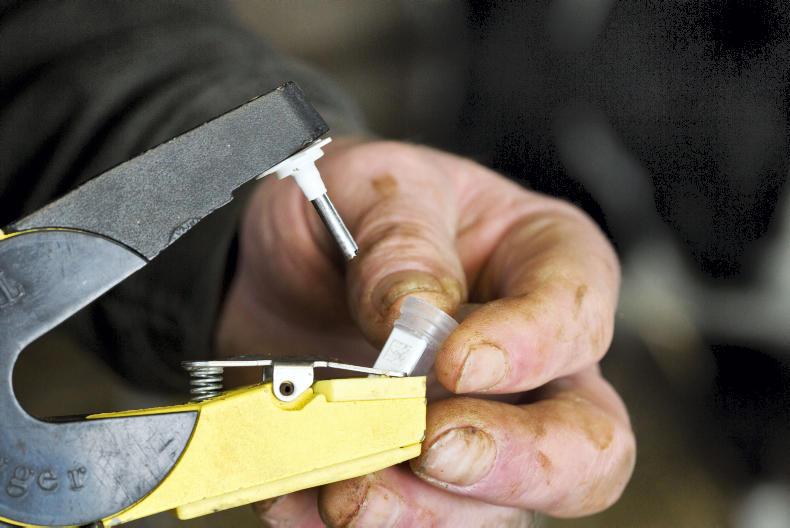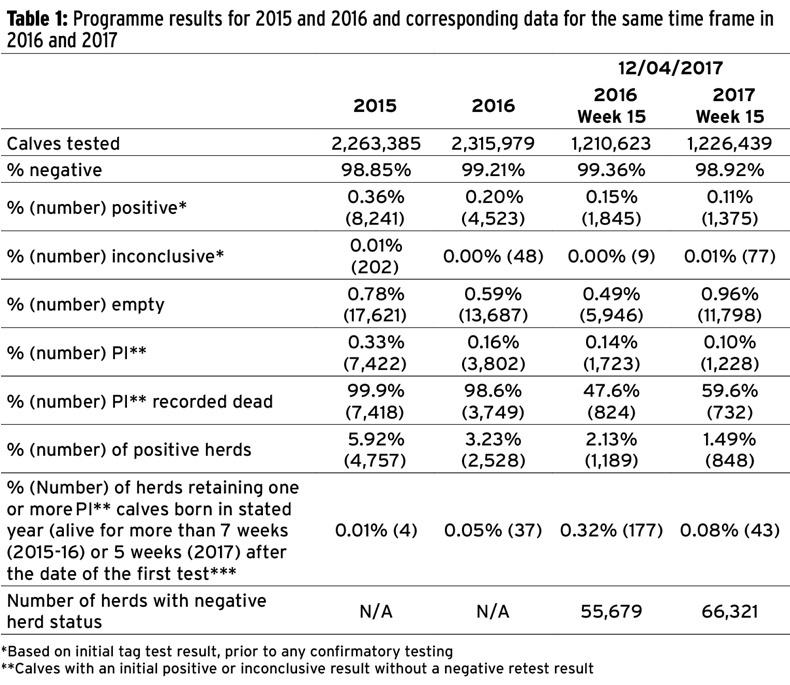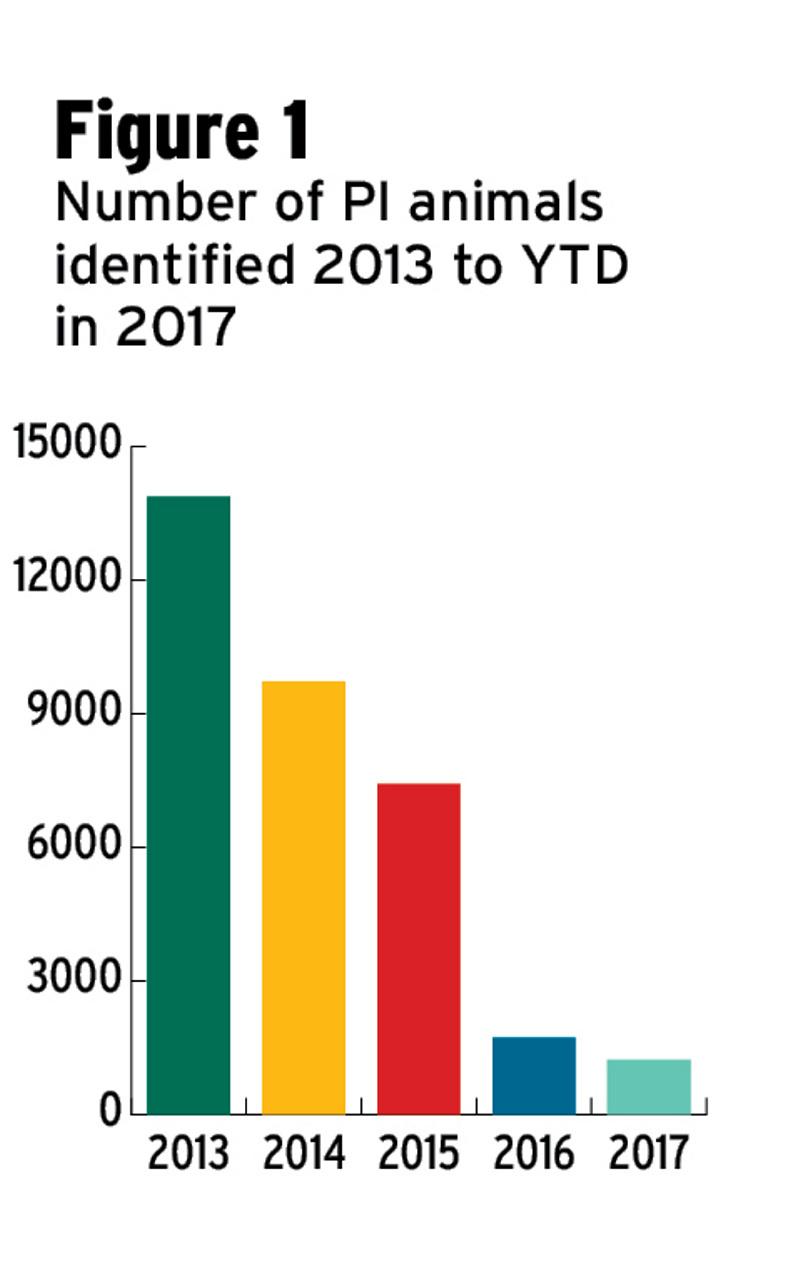
LOYALTY CODE:
The paper code cannot be redeemed when browsing in private/incognito mode. Please go to a normal browser window and enter the code there

LOYALTY CODE:
The paper code cannot be redeemed when browsing in private/incognito mode. Please go to a normal browser window and enter the code there
This content is copyright protected!
However, if you would like to share the information in this article, you may use the headline, summary and link below:
Title: BVD changes generating more progress
The length of time PI animals remain on farms has fallen in 2017, with only 37 herds still possessing 2016-born PI animals and limiting further advancement.
https://www.farmersjournal.ie/bvd-changes-generating-more-progress-270804

ENTER YOUR LOYALTY CODE:
The reader loyalty code gives you full access to the site from when you enter it until the following Wednesday at 9pm. Find your unique code on the back page of Irish Country Living every week.

CODE ACCEPTED

You have full access to farmersjournal.ie on this browser until 9pm next Wednesday. Thank you for buying the paper and using the code.

CODE NOT VALID
Please try again or contact us.
For assistance, call 01 4199525
or email subs@farmersjournal.ie
Sign in

Incorrect details
Please try again or reset password
If would like to speak to a member of
our team, please call us on 01-4199525
Reset
password
Please enter your email address and we
will send you a link to reset your password

If would like to speak to a member of
our team, please call us on 01-4199525
Link sent to
your email
address
![]()
We have sent an email to your address.
Please click on the link in this email to reset
your password. If you can't find it in your inbox,
please check your spam folder. If you can't
find the email, please call us on 01-4199525.
![]()
Email address
not recognised
There is no subscription associated with this email
address. To read our subscriber-only content.
please subscribe or use the reader loyalty code.
If would like to speak to a member of
our team, please call us on 01-4199525
 This is a subscriber-only article
This is a subscriber-only article
Update Success !
Changes to the Bovine Viral Diarrhoea (BVD) Financial Supports Programme and tighter movement restrictions introduced earlier this year by the Department of Agriculture, Food and the Marine are having the desired effect.
As detailed in Table 1, there are just 43 herds that have a persistently infected (PI) animal born in 2017 remaining in the herd from a total of 848 herds.
This compares with 177 herds from a total of 1,189 at the same stage in 2016. This is a threefold decrease in the proportion of herds retaining PIs in 2017 compared with 2016.
Herds are removing PI calves at a faster rate to satisfy a tighter time frame for compensation payments, with front-loading of those payments also helping greatly.

Beef herds
Beef herds will receive payment of €185 for each beef breed PI that is disposed of to a knackery, meat plant or abattoir within three weeks of the first test, while a reduced payment of €60 will apply where calves are disposed of within five weeks of the initial test.
A similar regime is in place for dairy heifers, with a payment of €150 for each dairy or dairy-cross heifer disposed of within three weeks, reducing to €35 where the animal is disposed of within five weeks of the initial test.
A payment of €30 was also introduced in 2017 for dairy bull calves disposed of within three weeks of the initial test and this is also said to be helping the swift removal of these lower-value calves.
The reason for the reduced payment if the calf is not disposed of within three weeks of the initial result is to ensure PI cattle are removed from the population as soon as possible, thereby reducing the risk of further PIs developing in the herd and neighbouring herds.
Herd restrictions
Movement restrictions on herds maintaining a PI animal for more than five weeks after the date of the first positive or inconclusive test result have also enticed many farmers to dispose of PI animals.
As well as movement restrictions, the Department is issuing notifications to neighbouring herds advising them that there is a PI animal present and advising them to take appropriate biosecurity measures.
The last element is a follow-up veterinary investigation of all herds with PI calves born in 2017. The visit is funded under the Rural Development Plan and should take place within three months of the first positive result.
Lower incidence
The table details results for 2015 to 2017, so fails to highlight the sharp fall (from 13,877 PIs in 2013 to 3,802 in 2016)in the number of PI animals identified since the compulsory eradication programme was introduced in 2013 (following a voluntary year in 2012).
While huge strides have been made, the success of the eradication programme and ending of compulsory tissue-tag testing is being delayed by PI animals being retained in herds and the associated risks of its continued spread, particularly in naïve herds.
To this end, it is highly unfortunate that the 37 herds retaining PI animals are limiting further progress.
It is necessary to deal with PI calves in a more ruthless fashion as BVD eradication schemes progress.
The retention of PIs is a false economy for the individual farmer, as these animals rarely reach their second birthday.
Until they die, they are excreting the virus, which causes illness in calves, early embryonic death and the development of future PIs in both the herd of origin and neighbouring herds.
Visit www.animalhealthireland.ie for weekly BVD eradication programme results and associated information.

SHARING OPTIONS: